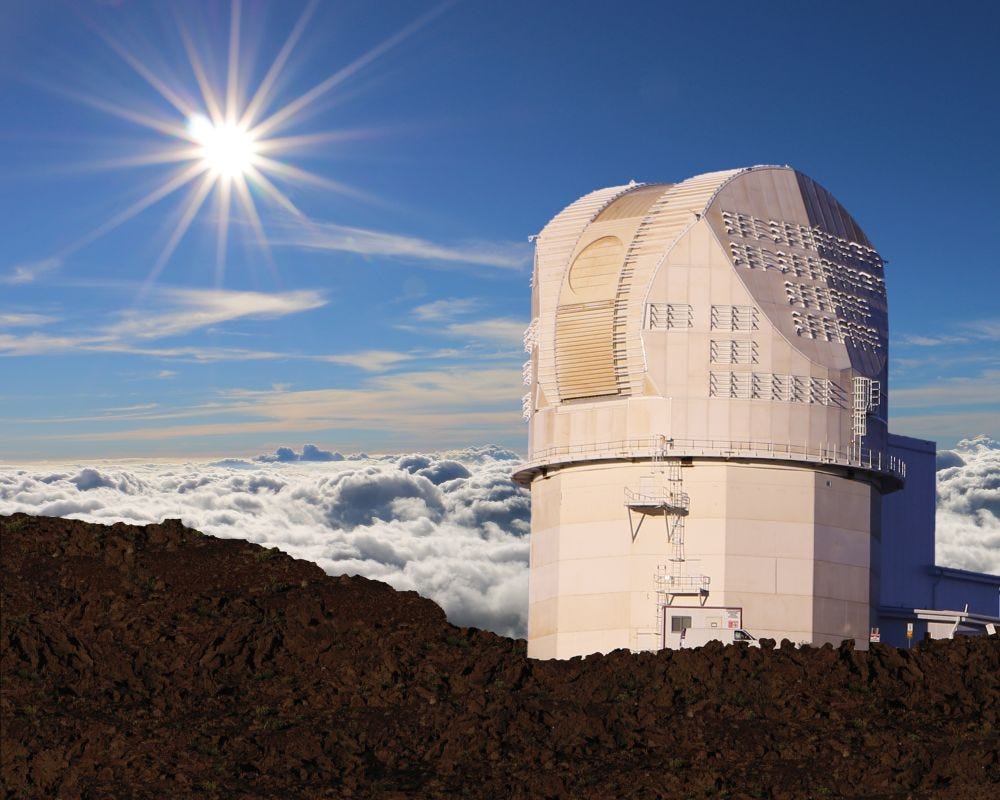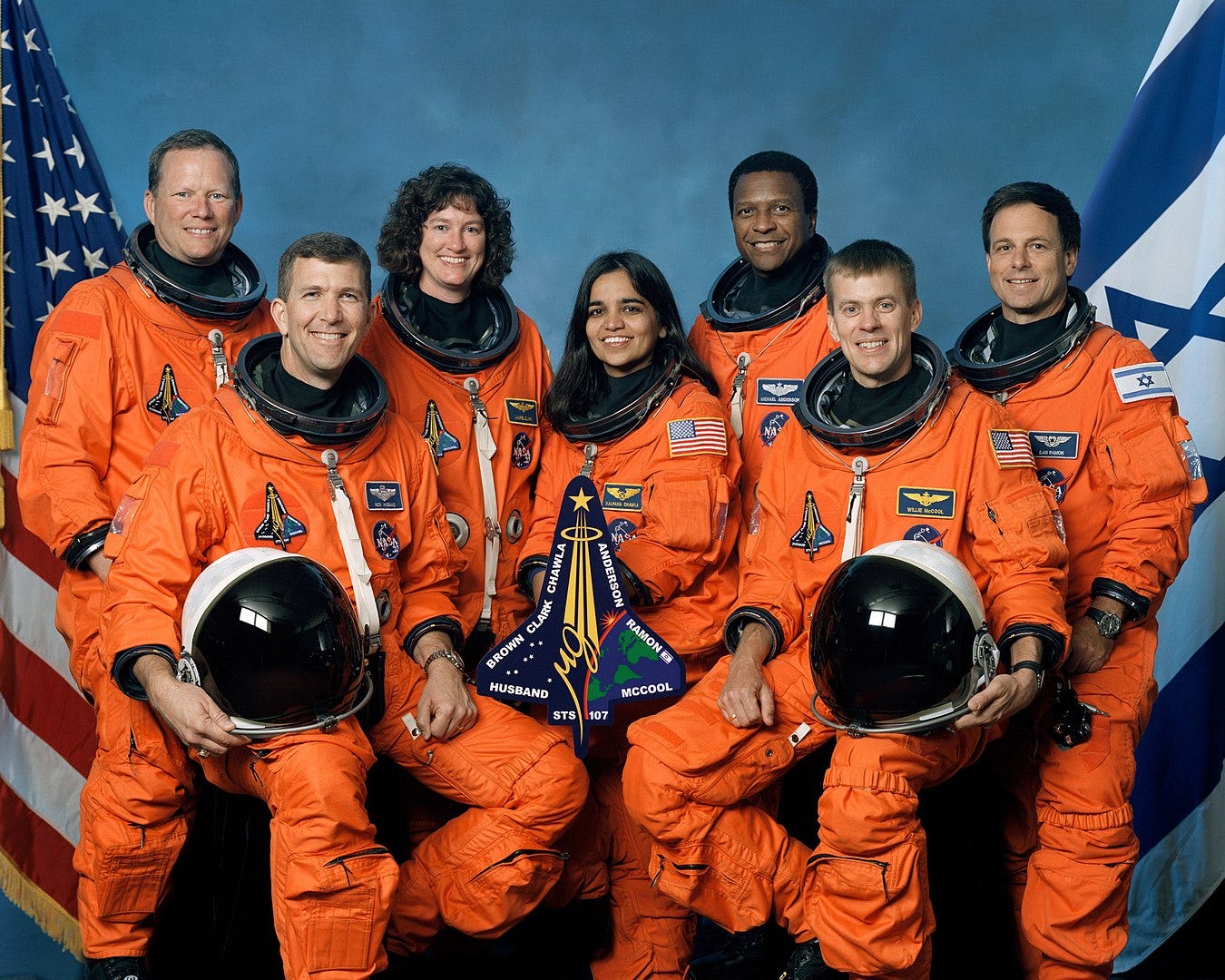The Cosmic Companion February 1, 2020
New eyes in space and on Earth open to explore the Universe, artificial intelligence may be fooled in the search for extraterrestrial life, and remembering the crew of the space shuttle Columbia.
Hello everyone!
In this issue of The Cosmic Companion, we examine the opening of two new observatories – one on the ground, and one in space. We will also learn about a new study showing how artificial intelligence can be fooled in the search for extraterrestrial life, and we will remember the crew of the space shuttle Columbia, lost 17 years ago when their vehicle disintegrated on re-entry while returning home to Earth.
Listen and subscribe to Astronomy News with The Cosmic Companion through any major podcast provider, including iTunes, Spotify, or TuneIn! Or, listen in at: https://thecosmiccompanion.substack.com.
The Cosmic Companion also offers a premium newsletter, featuring weekly exclusive videos, the astronomy comic of the week, and more. Just $5 a month, or $50 a year! Sign up at: https://thecosmiccompanion.substack.com.
Or, you can buy me a cup of coffee for my work!
Let’s take off!
The Week in Space
Inouye Solar Telescope Scores Big with First Video of Sun
By James Maynard
The most advanced solar telescope in the world just dropped their first public video of the Sun, and it is stunning.

The Daniel K. Inouye Solar Telescope in Hawaii gives astronomers an unprecedented look at our parent star. Image credit: NSO/NSF
Astronomers using the new Daniel K. Inouye Solar Telescope in Hawaii have released their first public images of the Sun, and they are the most detailed images of our parent star ever taken. Images from the next-generation National Science Foundation (NSF) solar observatory reveal details on the surface measuring just 30 kilometers (18 miles) in diameter.
The new four-meter (157 inch) instrument (the largest solar telescope in the world) recorded images and video of turbulent plasma on the surface of the Sun, providing an unprecedented level of detail for solar researchers.
Read more: http://bit.ly/Inouye-Solar-Telescope
CHEOPS Opens its Eyes in Study of Alien Worlds
By James Maynard
The CHEOPS observatory, launched just six weeks ago, has opened its lens cover, preparing for a mission to study thousands of worlds orbiting other stars.

An artist’s impression of the CHEOPS observatory in space, ready for observations. Image credit: ESA ATG Media Lab
The CHEOPS (CHaracterising ExOPlanets Satellite) observatory, launched from French Guiana on December 18th, has just opened its electronic eyes to the sky.
CHEOPS, a joint mission from the European Space Agency (ESA) and the University of Bern, is not designed to discover new worlds, but to carefully study the size, mass, and composition of known exoplanets. Over the course of its mission, CHEOPS could examine thousands of alien worlds in unprecedented detail.
Read more: http://bit.ly/CHEOPS-Alien-Worlds
Could AI be Fooled in the Search for ET?
By James Maynard
Using artificial intelligence to search the skies for signs of alien life may present a unique set of problems not seen with human data analysis, a new study reveals.

Ceres, a dwarf planet orbiting in the main asteroid belt, is known for its sizable fields of salt and ice. Image credit: NASA
As the Dawn spacecraft orbited the dwarf planet Ceres, the spacecraft took images of the Vinalia Faculae region on that diminutive world. When examined by artificial intelligence, the photographs appeared to show a dark triangle encompassing a bright square region. The problem was that this triangular feature is just an illusion created by several smaller markings seen on the surface of that world.
More than a minor illusion, this finding from the Spanish Foundation for Science and Technology (FECYT) suggests that instead of eliminating human error in the detection of patterns, artificial intelligence could have its own unique problems identifying patterns within chaotic data..
Read more: http://bit.ly/AI-Fooled-Search-ET
Remembering Columbia and the Crew of STS-107
By James Maynard
Seventeen years ago, NASA suffered their third major loss in the exploration of space. This event would put a final nail in the coffin of the Space Shuttle program.

The official crew portrait of STS-107. From left to right are mission specialist David Brown, commander Rick Husband, mission specialist Laurel Clark, mission specialist Kalpana Chawla, mission specialist Michael Anderson, pilot William McCool, and Israeli payload specialist Ilan Ramon. Image credit: NASA
The Space Shuttle Columbia met a tragic fate on February 1, 2003, as the first spacecraft of its kind fell apart on re-entry over the southwestern United States. Seventeen years to the day after this heartbreaking accident, we look back at the final mission of STS-107.
Columbia was the first Space Shuttle launched into space, the most complex machine ever designed by the human race, until the completion of the International Space Station. The maiden voyage of the orbiter marked a turning point in the history of human space flight.
Read more: http://bit.ly/Remembering-Columbia-STS-107
Read more stories at www.thecosmiccompanion.com

Coming soon: The First Woman on the Moon: The Past and Future History of Women in Space by James Maynard
Thanks for reading!
You can also listen to my new podcast, Astronomy News with The Cosmic Companion, available on all major podcast distributors, including iTunes, Spotify, and TuneIn! Or, tune in at: https://thecosmiccompanion.substack.com. You can also add Astronomy News with The Cosmic Companion to your flash briefings on Amazon Alexa!
If you want to keep up with the latest updates and news about astronomy and space exploration, visit www.thecosmiccompanion.com, join my Facebook page, subscribe on YouTube, and follow @TheCosmicCompanion on Instagram and @CompanionCosmic on Twitter.
Remember - VIP subscribers receive this newsletter, plus a second weekly newsletter with sneak previews of each video episode of Astronomy News with The Cosmic Companion, an astronomy comic of the week, rare space photos, and more! Plans start at just $5!
Do you know someone else who would love this newsletter? Please share! Invest in knowledge with a premium subscription for yourself or a loved one today (including advance viewings of my weekly video show)! Or, I’d love it if you could buy me a cup of coffee - I LOVE coffee!
Thanks for everything and I will see you next week!
Astronomy - Don’t Leave Home Without It!
- James


